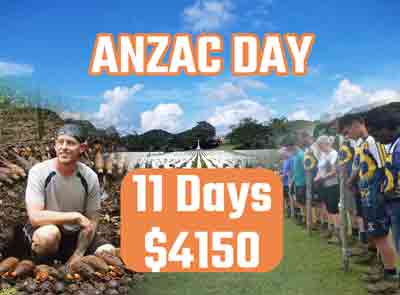Papua New Guinea : Personal Security in PNG – Travel and Safety
Introduction – Papua New Guinea Safety
Embarking on the challenging trek along the Kokoda Track is a journey filled with historical significance and breathtaking landscapes. However, ensuring your personal security during your time in Papua New Guinea (PNG) is of utmost importance. This article aims to provide prospective trekkers with comprehensive insights into personal security, highlighting the connection to the wartime Kokoda Campaign and addressing contemporary challenges in the region.
Understanding Papua New Guinea’s Security Landscape
The Kokoda Track and Its Historical Significance
The Kokoda Track, a 96-kilometer trail, holds historical importance as the site of fierce battles during World War II between Australian and Japanese forces. Today, it attracts trekkers from around the world seeking to retrace the footsteps of those who fought for freedom.
Papua New Guinea’s Security Challenges
While PNG has moved beyond its wartime history, it faces modern security challenges. Trekkers need to be aware of potential risks, including tribal conflicts, road accidents, and the risk of violent crime in certain urban and tribal areas.
Personal Security Travel Tips for Trekkers
General Safety Advice
- Stay Informed: Keep an eye on local news and monitor the media for any security updates. Pay close attention to your personal security, especially in areas prone to tribal conflicts.
- Travel Insurance: Ensure you have comprehensive travel insurance that covers medical emergencies, trip cancellations, and evacuation if needed.
- Entry Requirements: Be aware of and comply with the entry requirements for PNG. This includes obtaining the necessary visas and permits.
Security Along the Kokoda Track
- Security Escorts: Considering the remoteness of some areas along the Kokoda Track, using a security escort is a smart precautionary measure. The Kokoda Track Authority can provide information on this.
- Site-Specific Risks: Be aware of specific risks along the trail, such as unexploded ordnance from the wartime era and potential hazards in areas where tribal fighting occurred.
Personal Security in Port Moresby and Popondetta: Contrasting Urban Challenges
In urban centres like Port Moresby and Popondetta, trekkers should exercise heightened caution due to the inherent security challenges associated with densely populated areas. Port Moresby, as the capital, experiences typical urban issues, including the risk of street crime and occasional civil unrest. Popondetta, while smaller, has its own set of urban challenges. Trekkers are advised to be particularly vigilant in these urban environments, safeguarding their belongings and staying informed about local safety conditions.
Additionally, paying close attention to personal security advice for Papua New Guinea, including using security escorts when needed, is crucial. Conversely, the villages along the Kokoda Track offer a contrasting atmosphere of tranquillity and close-knit communities.
The remoteness of these villages contributes to a sense of security, with locals often welcoming trekkers warmly. While trekking the Kokoda Track, the villages provide a unique and safer environment compared to the bustling urban centres, allowing trekkers to immerse themselves in the rich culture and hospitality of the local communities.
Conclusion
Embarking on a trek along the Kokoda Track is an enriching experience, but it’s crucial to balance the adventure with a keen awareness of personal security. By staying informed, taking necessary precautions, and being mindful of contemporary security dynamics, trekkers can ensure a safe and memorable journey through the heart of Papua New Guinea. Safe travels!
FAQ’s
Q: Is Papua New Guinea safe for travellers?
A: Papua New Guinea has some security challenges, and travellers are advised to be cautious and stay informed about the current situation. It’s important to follow the latest travel advice for Papua New Guinea and be aware of your surroundings.
Q: What are the personal security concerns in PNG?
A: Personal security concerns in PNG include issues such as theft, petty crime, and occasional violent incidents. It is important to be vigilant, especially in urban areas, and take precautions to ensure personal safety.
Q: Are there any specific safety precautions for road travel in PNG?
A: Road travel in PNG can be challenging due to poor road conditions and limited infrastructure. It is advised to travel during daylight hours, avoid remote areas without reliable communication, and be cautious of other vehicles on the road.
Q: How should travellers negotiate personal security in Papua New Guinea?
A: Travelers should negotiate personal security in PNG by staying updated on the current security situation, seeking advice from local authorities, and being mindful of cultural differences in various regions.
Q: What is the travel advice for Papua New Guinea?
A: The travel advice for Papua New Guinea includes staying informed about the security situation, avoiding large crowds or protests, and keeping a low profile to minimize the risk of becoming a target for theft or other crimes.
Q: What precautions should travellers take in PNG’s western province?
A: Travelers in PNG’s western province should take precautions by being aware of cultural sensitivities, respecting local customs, and seeking advice from reliable local sources or tour operators.
Q: Is it safe to travel to Enga province in Papua New Guinea?
A: Enga province in Papua New Guinea may have specific security concerns, and travellers are advised to stay informed about the current situation, adhere to local laws and customs, and seek advice from reputable sources before visiting the region.
Q: What are the security considerations for travellers using airports in PNG, such as Lae and Nadzab airport?
A: Travelers using airports in PNG should be vigilant about their personal belongings, avoid displaying valuable items, and be cautious of potential security risks while navigating through the airport and surrounding areas.
Q: How should travellers deal with security concerns at border posts in Papua New Guinea?
A: Travelers should deal with security concerns at border posts in Papua New Guinea by following the guidance of local authorities, having necessary travel documents in order, and being prepared for potential delays or security checks.
Q: What should travellers do if they receive new security alerts at short notice in PNG?
A: If travellers receive new security alerts at short notice in PNG, they should take them seriously, seek updated travel advice, and consider adjusting their travel plans or activities to ensure their safety.




